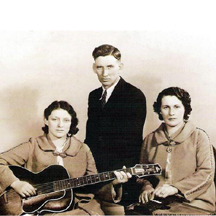The Carter Family was a traditional American folk music group that recorded between 1927 and 1956. Their music had a profound impact on bluegrass, country, Southern Gospel, pop and rock musicians as well as on the U.S. folk revival of the 1960's. They were the first vocal group to become country music stars. Their recordings of songs such as "Wabash Cannonball", "Can the Circle Be Unbroken", "Wildwood Flower", "Keep On the Sunny Side" and "I'm Thinking Tonight of My Blue Eyes" made these songs country standards. The original group consisted of Alvin Pleasant "A.P." Delaney Carter (1891–1960), his wife Sara Dougherty Carter (1898–1979), and his sister-in-law Maybelle Addington Carter (1909–1978). Maybelle was married to A.P.'s brother Ezra (Eck) Carter, and was also Sara's first cousin. All three were born and raised in southwestern Virginia, where they were immersed in the tight harmonies of mountain gospel music and shape note singing. (More from Wikipedia)
I was also able to tour the Country Music Hall of Fame Museum, where I learned about the disparate forces leading to what is known as country music: rockabilly from Elvis Presley on down (my favorite form of country and, by now, maybe my favorite form of rock and roll as well), yodeling masters (particularly Jimmie Rodgers, whose 1927 hit "Blue Yodel No. 1 (T for Texas)" was the first half-million-selling country song), honky tonk (the kind of music heard in early country music clubs, as personified by Hank Williams Sr.), mountain folk music (most importantly the Carter Family), Western music (often in the form of singing cowboys like Gene Autry and Roy Rogers – in fact, for many years the genre was called country and western), and Western swing (basically countrified big-band sounds). I don't know too much about the latter strand, and Jimmie Rodgers is a bit old-fashioned for my tastes (though I have a compilation CD that I sure hope turns up among those remaining to be cleaned up from Katrina); but I have learned enough about the other foundational musicians over the years and other early forms of country to become a major fan.
(February 2015)















